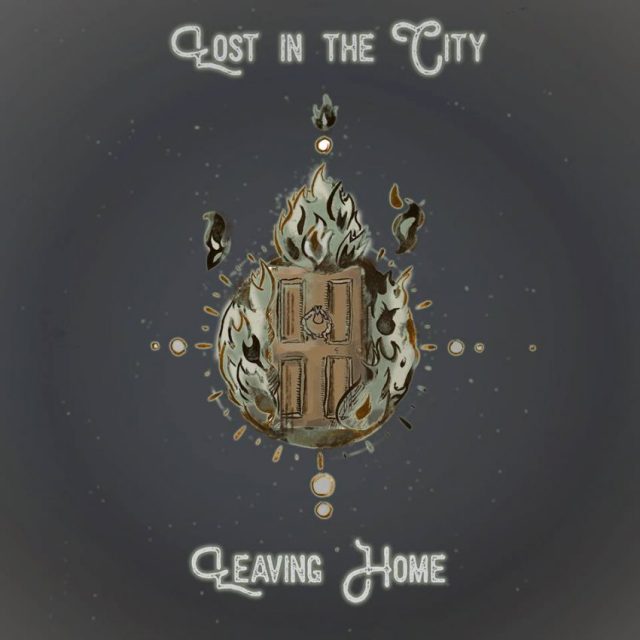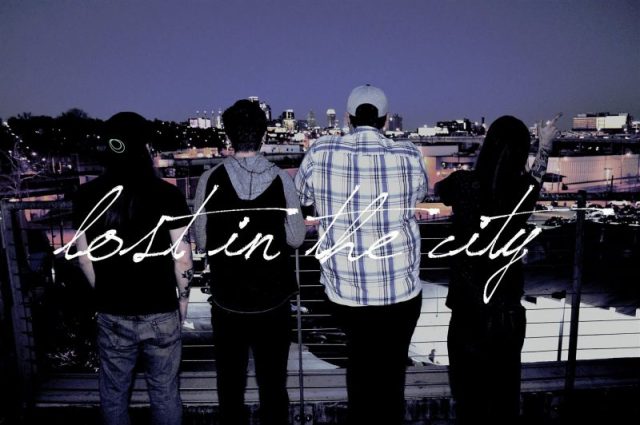
More than two years ago, in June 2016, Kansas City, Missouri alternative rock band Lost in the City released their superb debut album Genesis. It’s a monumental work, with powerful, thoughtfully-written lyrics addressing the familiar subjects of love, relationships and break-ups, but also the travails of touring, anxiety and depression, delivered with blistering guitar riffs, thunderous drums and passionate vocals. (You can read my review of Genesis here.) Later that year, in the fall of 2016, they began writing songs for their new album Leaving Home, which drops today, October 12. Two years in the making, Leaving Home reflects the band’s growth and maturity, and the many life changes individual band members experienced, including graduating from college, changing jobs, relationships, and literally leaving home by moving out of their parents’ house for the first time.

Lost in the City is Shane Radford (Lead Vocals, Guitar, Keys, Synths), Dustin Proctor (Guitar), Cullan Wiley (Bass) and Kyle Constant (Drums). For Leaving Home, Bret Liber, who’s also a musician in his own right, with the rock band Young Medicine, played keyboards in addition to recording, mixing and mastering the album tracks.
The album opens with “The Battle of Schrute Farms,” arriving in a barrage of raging guitars, humming bass and hammering drumbeats. Shane is joined by Jordan Rebman on vocals, and together, they’re an emotional powerhouse as they belt out the biting lyrics about cowardice in a relationship: “I’m forgetting the way you play, but I don’t regret anything. You’ll move on and so will the sun. Just take me for granted. Despite your efforts, you can’t take this from me.” At least that’s my take on it after Googling the song’s title, and finding this definition: “Thought by many to be the Northernmost battle of the American Civil War, The Battle of Schrute farms was instead a code name for the refuge for cowards escaping the the drudgery and conflict of war.”
“From the Floor of an Attic in Portland” is an interesting song, with unusual chord progressions and instrumentation. Loud, fuzzy guitars, buzzing bass, piercing synths and complex percussion are dominant musical elements on this arresting track. Shane almost screams the hopeful lyrics “Tonight is the night to save a life. And I do believe that we all can change.” The soaring vocal harmonies in the chorus are wonderful, and I love the delicate piano riff in the outro.
As I continue listening to the album, one of the things that stands out is the sheer power and exuberance of the song arrangements, instrumentals and vocals. “Daylight” essentially captures the essence of the album – that embracing the inevitable changes that come our way is the key to surviving this thing called life. The jagged guitar riffs and thunderous percussion are a perfect match for the uplifting lyrics: “The biggest decisions, I’ve made without a plan. Growth is the key to finding your purpose. I feel like I’m wandering away from old notions. / Everything looks better in the daylight. I’m taking time to forget what I’m seeing. My life’s been changing for some time now.” The heartwarming video shows intimate scenes of the band just being themselves, playing, rehearsing and performing.
“You Stopped This Train” is a hard-hitting melodic rock song about someone who’s chosen to abandon a relationship the singer believed was strong and lasting. Musically, the track features Shane and Dustin’s gritty, shredded guitars and Kyle’s furious drums, all anchored by Cullan’s powerful bass. The screaming guitars at the end of the track are fantastic, and perfectly convey the pain Shane expresses in his wailing vocals “You stopped this train when everything was going great. You walked away as you let it all fall apart.”
With a barrage of jagged riffs and sweeping piano-driven synths, “Bangarang!” seems to call out the futility of war and conflict: “The tales of war aren’t exaggerated. The infighting ranks fall away./ Revenge should be used in no situation. It brings no change, just cold isolation.” The raucous “Into the Dark” features tortured riffs of gritty, distorted guitars and industrial-strength drums pounding out an exhilarating beat. Shane fervently sings of an optimistic light at the end of the tunnel: “No matter the changes, we’ll push through. Lifting our heads as we move on by. We don’t have time to doubt. Time will tell if we made it.” This optimistic outlook continues with “The Light Inside My Head,” as Shane sings of moving forward and not letting past mistakes hold you back: “I’m taking time to take note of where I am. Progress is progress, no matter how hard. I’m holding my future in my own hands, Bright sides are a brand new cycle.”
One of my favorite tracks is “Metro Apartments,” with its haunting melody and grandiose instrumentals. Bret Liber’s guest vocals nicely complement Shane’s, and I love their vocal harmonies in the chorus. The lush, sweeping synths, thunderous drums and shredded guitars are positively spine-tingling. “The Upside Down” is a 48-second long interlude with dramatic piano-driven synths, and Shane’s repeated line “I’m sorry I grew up. I’m sorry I failed.” The brief track serves as an intro to the final track “Monsters Are(n’t) Real Pt. 2,” which is actually a continuation of the final track on their first album Genesis, “Monsters Are(n’t) Real.” It’s a very dark and hard-hitting song, with piercing, tortured synths, raging guitars and furious drums that seem to grab us by the throat. All the optimism expressed in many of the previous tracks has been replaced with a overwhelming sense of hopelessness and despair, resulting from a realization that the world is in fact a very bad place, and our futures are bleak (sort of how I’m feeling under our current presidential administration and Congress).
The world is worse than I thought it would be.
Filled with hope, I ran to the sea.
A sea of wanderers? Who could they be?
Filled with anger, who are we?
I’m sorry I grew up. I’m sorry I failed.
The monsters in our heads are so very real.
The doubts that fill us are the truth.
We’re just expendable pieces of youth.
War cries are louder than we need.
We take time to be free and see.
I’m sorry I grew up. I’m sorry I failed.
The monsters in our heads are so very real.
The sky is filled with dashed hopes and dreams.
“If you work hard, you’ll be whatever you want to be.”
We all know the truth as we march along.
We’re a piece of the puzzle, alone not strong.
It’s interesting that Lost in the City would choose to end their album on such a somber note. Nevertheless, Leaving Home is a brilliant and provocative work – a coming-of-age of sorts for this talented and thoughtful group of guys. Their songwriting and musicianship is outstanding, and I’m happy to watch them grow and mature as a band.
Connect with Lost in the City: Website / Facebook / Twitter / Instagram
Stream their music on Spotify / Apple Music / Soundcloud
Purchase on Bandcamp / iTunes

Awesome. Another one I like. I have added them to my library. I wanted to add Black Lakes, but nothing Apple right now. A couple of good ones. Thanks for the heads up.
LikeLiked by 1 person
I will have to check this out. Great to see you covering one of our local bands here in KC. Lots of good music in this town.
LikeLiked by 1 person